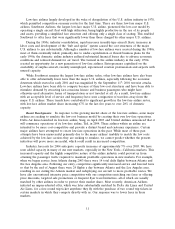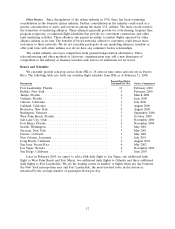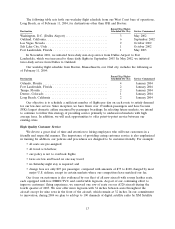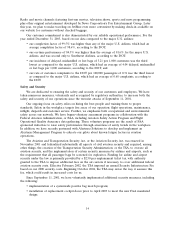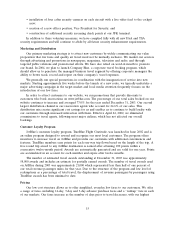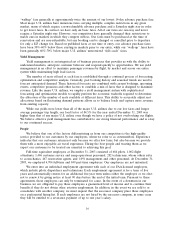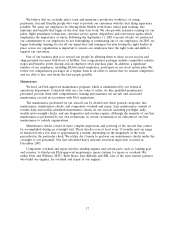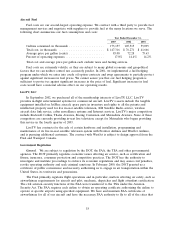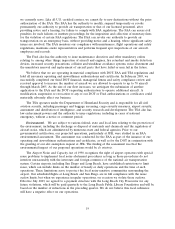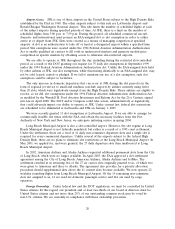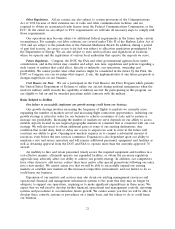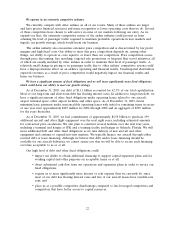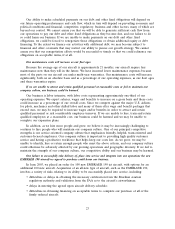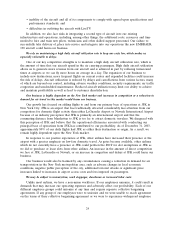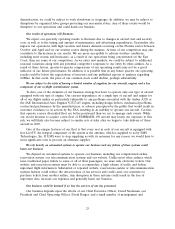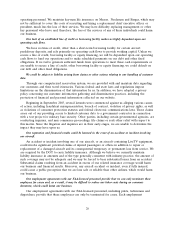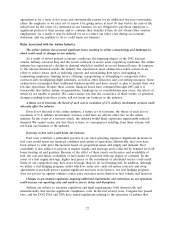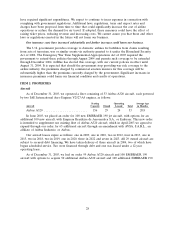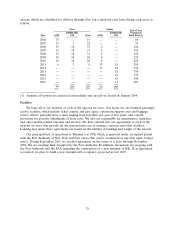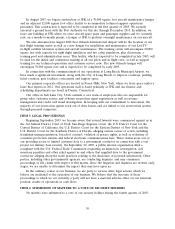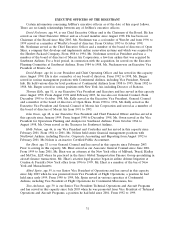JetBlue Airlines 2003 Annual Report Download - page 24
Download and view the complete annual report
Please find page 24 of the 2003 JetBlue Airlines annual report below. You can navigate through the pages in the report by either clicking on the pages listed below, or by using the keyword search tool below to find specific information within the annual report.Other Regulations. All air carriers are also subject to certain provisions of the Communications
Act of 1934 because of their extensive use of radio and other communication facilities, and are
required to obtain an aeronautical radio license from the Federal Communications Commission, or the
FCC. To the extent we are subject to FCC requirements, we will take all necessary steps to comply with
those requirements.
Our operations may become subject to additional federal requirements in the future under certain
circumstances. For example, our labor relations are covered under Title II of the Railway Labor Act of
1926 and are subject to the jurisdiction of the National Mediation Board. In addition, during a period
of past fuel scarcity, air carrier access to jet fuel was subject to allocation regulations promulgated by
the Department of Energy. We are also subject to state and local laws and regulations at locations
where we operate and the regulations of various local authorities that operate the airports we serve.
Future Regulation. Congress, the DOT, the FAA and other governmental agencies have under
consideration, and in the future may consider and adopt, new laws, regulations and policies regarding a
wide variety of matters that could affect, directly or indirectly, our operations, ownership and
profitability. We cannot predict what other matters might be considered in the future by the FAA, the
DOT or Congress, nor can we judge what impact, if any, the implementation of any future proposals or
changes might have on our business.
Civil Reserve Air Fleet. We are a participant in the Civil Reserve Air Fleet Program which permits
the United States Department of Defense to utilize our aircraft during national emergencies when the
need for military airlift exceeds the capability of military aircraft. By participating in this program, we
are eligible to bid on and be awarded peacetime airlift contracts with the military.
Risks Related to JetBlue
Our failure to successfully implement our growth strategy could harm our business.
Our growth strategy involves increasing the frequency of flights to markets we currently serve,
expanding the number of markets served and increasing flight connection opportunities. Achieving our
growth strategy is critical in order for our business to achieve economies of scale and to sustain or
increase our profitability. Increasing the number of markets we serve depends on our ability to access
suitable airports located in our targeted geographic markets in a manner that is consistent with our cost
strategy. We will also need to obtain additional gates at some of our existing destinations. Any
condition that would deny, limit or delay our access to airports we seek to serve in the future will
constrain our ability to grow. Opening new markets requires us to commit a substantial amount of
resources, even before the new services commence. Expansion is also dependent upon our ability to
maintain a safe and secure operation and will require additional personnel, equipment and facilities as
well as obtaining approval from the DOT and FAA to operate more than the currently approved 70
aircraft.
An inability to hire and retain personnel, timely secure the required equipment and facilities in a
cost-effective manner, efficiently operate our expanded facilities, or obtain the necessary regulatory
approvals may adversely affect our ability to achieve our growth strategy. In addition, our competitors
have often chosen to add service, reduce their fares and/or offer special promotions following our entry
into a new market. We cannot assure you that we will be able to successfully expand our existing
markets or establish new markets in this increased competitive environment, and our failure to do so
could harm our business.
Expansion of our markets and services may also strain our existing management resources and
operational, financial and management information systems to the point that they may no longer be
adequate to support our operations, requiring us to make significant expenditures in these areas. We
expect that we will need to develop further financial, operational and management controls, reporting
systems and procedures to accommodate future growth. We cannot assure you that we will be able to
develop these controls, systems or procedures on a timely basis, and the failure to do so could harm
our business.
21


